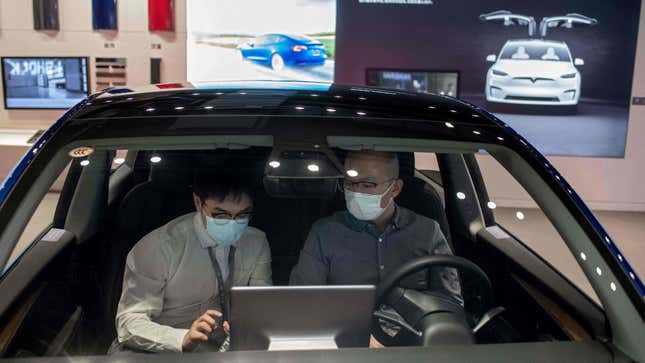
Electric car company Tesla will open a data center in Shanghai, China in order to store data collected from its customers’ cars in the country and stay on the right side of Beijing’s cybersecurity laws, according to a new report from the South China Morning Post. All data that foreign companies collect in China about their customers must be stored in China in order to adhere to a tough data law passed in 2017.
“We have set up a data centre in China to locally store data--collected by Tesla vehicles sold in mainland China--and we will add more. All data generated from cars sold in mainland China will be stored within China,” Tesla wrote on the social media app Weibo, sometimes known as China’s version of Twitter.
Apple recently built its own data center to adhere to the same law for Chinese users of its iCloud storage service, as the South China Morning Post notes. That move previously drew criticism from human rights groups that worry it gives the Chinese government too much access to the iCloud data of Chinese users—data that previously would’ve required a U.S. court order when the iCloud keys were stored on American soil.
Tesla expanded into China, the largest electric car market in the world, in 2019 but has come under increased scrutiny in the country over the past few months. Customers in China have raised concerns over safety, including during a highly publicized spectacle at the Shanghai Auto Show last month when a protester stood on a Tesla Model 3 while shouting, “Tesla brakes fail.”
Chinese officials have also drawn attention to concerns that the U.S.-based car maker could transmit sensitive visual data back to the U.S. through its imaging capabilities. Tesla CEO Elon Musk denies all spying concerns from Chinese officials, but that didn’t stop Beijing from banning all military staff from using Tesla cars back in March.
The U.S. and China have battled over alleged spying on both sides, with American officials warning of potential threats from Chinese companies like Huawei, which has historic ties to the Chinese military. Social media platform TikTok has also come under scrutiny for its vulnerabilities, including Beijing’s access to customer data. But China has its own concerns over how U.S. companies operate on its soil, and Tesla has been just the most recent target of Beijing’s ire.
Tesla has a few reasons to be concerned after investing a lot of money in China, especially after sales recently slowed. Gordon Johnson, CEO of GLJ Research, pointed out to CNBC on Monday that other car companies like Ford are now producing electric vehicles with better battery capabilities for the same amount of money.
“In April, the first month of this [financial] year, they’ve gotten completely eviscerated in China,” Johnson said of Tesla, pointing out their sales were down 66% month over month.